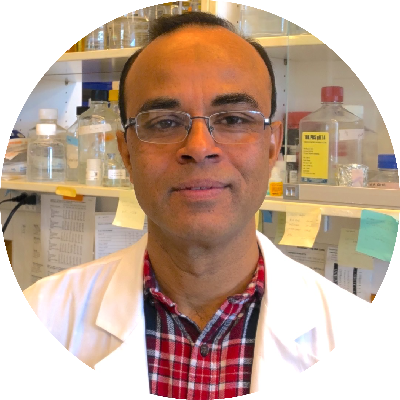
Mohammed Repon Khan
We discovered the function of toxic a-synuclein (a-syn) protein aggregates in the pathogenesis of Parkinson’s disease (PD). Pathologic a-syn aggregation is a central event in Parkinson’s disease progression. Therefore, understanding the function of pathologic a-syn aggregates makes a significant conceptual advancement toward finding drug and biomarkers for this disease. We report that pathologic a-syn binds tuberous sclerosis complex 2 (TSC2) protein and disassembles TSC1-TSC2 complex that leads to persistent mTORC1 activation and mRNA translation. Inhibition of mTOR and translation by pharmacological and genetic approaches rescue pathology and neurodegeneration in PD models. I performed this research in the lab of Ted and Valina Dawson at the Institute for Cell Engineering in the Department of Neurology.
Questions & Answers
Why did you choose Johns Hopkins for your work?
Johns Hopkins Medicine is the leader in biomedical research. After getting a Ph.D. in neuroscience, my goal was to pursue research in neurodegenerative disease, and I found the best Parkinson’s disease research lab here at Johns Hopkins.
What does receiving this award mean to you personally and professionally? Do you have any connection with the particular award you received?
Receiving the Daniel Nathans Research Award is truly inspiring and encouraging — I really feel honored. When I joined Johns Hopkins Medicine, I saw successful trainees and postdocs receive these awards. Certainly, this award will be a great motivation for me to pursue a career in academia.
What contributed to your project’s success?
I am particularly thankful for my mentors, Ted and Valina Dawson, for the opportunity to pursue this interesting project, and their unconditional support and guidance from beginning to end. I had strong graduate training at Kausik Si’s lab in the Stowers Institute, which tremendously complemented this research project. Additionally, collaboration with Taekjip Ha’s lab has significantly advanced our understanding in this project. Lastly, I am grateful to my family and friends for their sacrifices and continuous support.
What thoughts do you have about Young Investigators’ Day itself, as a celebration of the roles student and fellows play in research at Johns Hopkins?
It is really hard to be successful without recognition and encouragement, whatever job you do. Young Investigators’ Day at Johns Hopkins is truly a great way to recognize trainees, fellows and students.
What has been your best/most memorable experience while at Johns Hopkins?
One of the best memorable experiences at Hopkins was the independence in choosing and accomplishing my postdoctoral training project. And, of course, tremendous support from mentors, colleagues and collaborators.
What are your plans over the next year or so?
Currently, I am a research associate in neurology and am looking for an independent faculty position in academia.
Tell me something interesting about yourself that makes you unique. Do you have any special hobbies, interests or life experiences?
I was born and grew up in a rural Bangladeshi village, where I enjoyed enough freedom to do whatever I wanted. That might have contributed to my current effort and originality. I also love to play sports — soccer, cricket and many others.